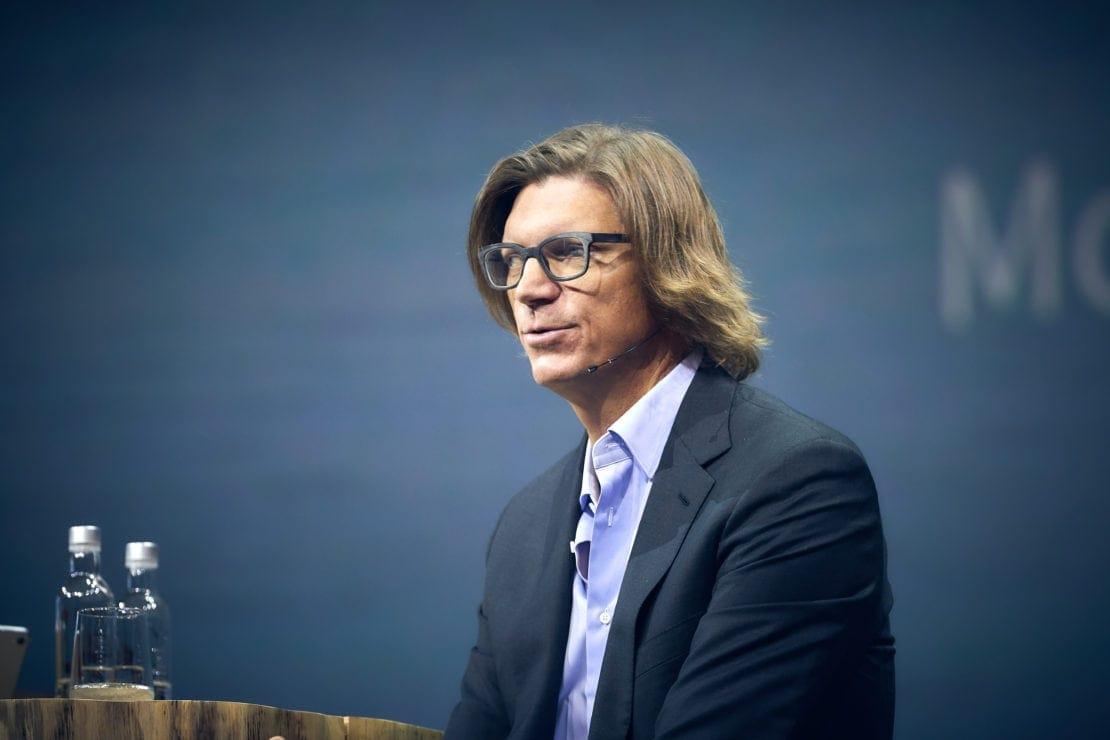20Nov2018
Society needs to develop a culture that encourages trial and error, raises future generations to make the most of technological change through education, and empowers game-changing entrepreneurs to disrupt the status quo and create positive global impact, according to venture capitalist and Skype Co-Founder Niklas Zennström.
Zennström told the moderator Timo Rein and the Nordic Business Forum audience that he has witnessed a massive change in Europe’s technology industry since the dot-com crash at the beginning of the millennium. In the years that followed, entrepreneurs began to rebuild and find success, paving the way for others. He said that the aftermath of the tech bubble created the right conditions for entrepreneurs like himself to become role models and to inspire others, in turn generating a continuous feedback loop of individuals wanting to drive change and have an impact.
“When Skype was sold, it was the biggest exit after the dot-com period. I wanted to build on this and inspire others to have bigger ambitions,” Zennström declared, referencing his work at tech investment firm Atomico.
As a result, today’s Nordic technology companies have loftier ambitions and are not just aiming to build Nordic companies, but global ones. The tech veteran cited Stockholm- and Helsinki-based game firms King and Supercell, as well as the music streaming service Spotify as examples of companies that are proving that Nordic tech can challenge global markets.
Scientists are getting out of the laboratory to put frontier and deep technologies to work in commercial settings, and top university graduates are being drawn to the tech industry. Also, 20 times more people want to be entrepreneurs today compared to 10 years ago in Finland alone.
Early mistakes write the tech sector playbook
The mistakes made by the pioneers in Nordic tech are being put to good use, according to Zennström. Mistakes contribute to the shared wisdom of the sector, almost in the form of playbooks for entrepreneurship. Seasoned entrepreneurs are also providing the financial backing for many newcomers. “50% of successful technology company founders are investing in new startups – and many early-stage investors used to be entrepreneurs,” Zennström observed.
What’s more, venture capitalists and large institutions are getting involved, including non-tech firms that want to stay abreast of digital transformation. “Today, almost everyone understands there is a digital transformation happening — either it has happened in your industry or it will happen. It’s extremely rare that there is a business leader that doesn’t care about it,” Zennström commented.
The result is a flourishing ecosystem that is creating successes. For example, after an IPO in September 2018, Farfetch was valued at more than USD $5 billion. Earlier the same year, Spotify was valued at more than USD $26 billion after its first day of trading. “They’re dwarfing what Skype did in 2005. The scale is getting bigger,” he added.
IoT and AI but not quite sci-fi
According to Zennström, two important, emerging technologies are artificial intelligence (AI) and the Internet of Things (IoT). He argued that AI is an enabler technology today similar to how smartphones and cloud computing became major enablers in the last decade.
“We’re in the early days of AI,” Zennström noted. “In most cases, it isn’t deep learning. It’s machine learning. It’s about taking a big data set, learning, figuring things out, and optimizing.” However, he said that futuristic scenarios involving a singularity – where an artificial super-intelligence will emerge and trigger exponential technological growth – is still a distant prospect.
“What’s interesting is that a few years ago, it was science fiction. Now, today, people are talking about when rather than if at all, but it’s certainly not around the corner.” Zennström added that the AI algorithms that we interact with on a daily basis are currently being deployed for small optimizations rather than general intelligence processes.
IoT, on the other hand, especially when used with machine learning, connects everything that’s not digital — such as manufacturing machinery, equipment, medical equipment, and warehouses. These devices use sensors and feedback loops to send data to a machine learning system for optimizing processes, primarily in industrial applications. Zennström described this deployment of IoT as an example of technology that won’t disrupt but that will improve efficiency and the bottom line.
“Future-proof” education adapts talent to new ways of working
Although no one can predict the future, let alone the next 10 years, Zennström said we can try to forecast different possible outcomes. One likely prospect is that autonomous vehicles (AVs) will take over the roads, although it is not possible to say how long it will take before they replace the entire global fleet of manned vehicles.
This will affect what kinds of jobs are available as well. As a result, Zennström called for society to consider ways to “future-proof” education to ready future generations of talent for new ways or working.
Failing, innovating, growing
The current technology ecosystem is not short of capital; talent has become a factor limiting growth. Zennström said that his discussions with companies have revealed that their biggest challenge is recruiting talented people who are motivated, smart, and who will buy into the company culture.
Today’s industry needs not only software engineers but people who are skilled in business development and understand how to provide exceptional customer service, particularly as companies expand across the world. Diversity has also proven to be a problem in the male-dominated industry. “There are way too few female founders and engineers in tech companies,” Zennström added.
The tech investor said that growth requires a change in perspective. “Instead of saying, this is what it’s always been, ask, ‘What could it be?’” However, he noted that it’s necessary to accept that the most likely outcome of a new venture will be failure – and that companies need to be comfortable with that fact. “Failure gives you learning, which you can use next time,” he added.
He explained that the popular Kazaa peer-to-peer file sharing software generated a financial loss and eventually faded out, “but we would not have been able to start Skype if we had not had Kazaa as our first experience. That failure enabled us to have future success.”
In the corporate environment, people are trained not to make mistakes and to stay focused on a core strategy. The challenge – or opportunity – is to build a culture where innovators can try and fail. Zennström claimed that the key to feeling comfortable with failure is to approach projects with a degree of naivety. The more experienced, educated, and well-read we are, the more likely we are to reject failure. Instead, a naïve approach allows us to question and experiment.
“It seems almost foolish from a risk-return point of view, but it’s the only way to innovate new things. It’s something to actually embrace,” Zennström declared.
Leveraging success for positive impact
Zennström advised CEOs to encourage disruptors to challenge legacy technology: “If you’re the CEO, listen to everyone that’s challenging your intellectual property and embrace it. And when they fail, encourage them to try again.”
A known philanthropist with his own charitable organization, Zennström also encouraged companies that want to have an impact on the planet to persevere. “Right now, we have more reason to care than ever before,” Zennström said. “We are exhausting our planetary resources and if we don’t fix climate change soon, the future won’t be that great. We know we’re living on credit from planet Earth,” he warned.
Despite his concerns, Zennström concluded on an upbeat note, declaring that, “Entrepreneurs are part of the solution. New companies that are using technology to have a positive impact is something I’m passionate about, and I see more and more of it — founders building companies with purpose and with positive world impact.”
“I love working with inspirational people who want to be game changers for a better world. Those are the people I want to partner with,” Zennström added.
About Nordic Business Forum 2018
Nordic Business Forum 2018 was held on 26-27 September in Helsinki, Finland, gathering together 7,500 CEOs, top executives, and entrepreneurs from over 40 countries.
Download the full Executive Summary and read what the speakers said on stage at Nordic Business Forum 2018.


